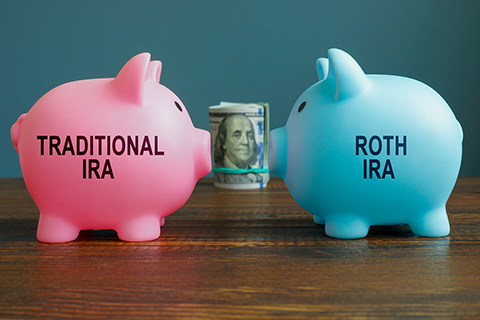The traditional IRA and the Roth IRA both will grow without income taxes reducing returns. The difference is that contributions to a traditional IRA may be tax deductible (depending upon income), and all distributions during retirement are taxable as ordinary income, while contributions to a Roth IRA are not deductible, but withdrawals are potentially free of income tax. One more difference—required minimum distributions (RMDs) must be paid from traditional IRAs when the owner reaches age 72, while there is no such requirement for Roth IRAs.
What happens to IRA money that remains in the account when the owner dies? Estate planning for qualified retirement plan benefits is an especially tricky area of tax practice. In general, funds remaining in such accounts must be distributed to beneficiaries during the ten years following the owner’s death. (An exception applies when the beneficiary is a surviving spouse.)
This “ten-year rule” is of recent vintage, it came in with the SECURE Act in 2019. In February 2022 the IRS proposed Regulations for implementing this law, a proposal that added new wrinkle to RMDs.
For a traditional IRA, if the owner dies before age 72 the beneficiary has complete freedom in determining how much to withdraw from the inherited IRA over the next ten years. All withdrawals will be subject to income tax at ordinary rates, so taxation can be spread over ten years by withdrawing one tenth every year. However, the beneficiary can also choose to leave all the money in the inherited IRA until the tenth year, for maximum tax-deferred growth. (Again, separate rules apply to surviving spouses.)
Under the Proposed Regs., a different rule applies if the owner dies after his “required beginning date,” which is generally April 1 of the year after the owner reaches age 72. In that case, the beneficiary must receive some money every year, based upon life expectancy. The option of leaving the account alone until the tenth year is not available.
What about the Roth IRA? Because the minimum distribution rules do not apply to Roth IRAs, there is no requirement that the inherited Roth IRA make any distributions at all until the tenth year, allowing for maximum tax-free growth in the account. The beneficiary is free to withdraw earlier, if desired, and all such withdrawals will be tax free.
Retirement income management is not something to be taken for granted, it can be almost as complicated as accumulating retirement capital during the working years. The many tax rules can be unfamiliar and, frankly, baffling. This is especially true when retirement plan assets, such as IRAs, are expected to be a substantial portion of the bequests to heirs, so that their resources also should be taken into account during estate planning. A Garden State Trust Company officer will be pleased to answer your questions in this regard, as well as any portfolio management concerns you may have.





